Hamlet经典独白to be, or not to be英汉对照及解析讲解学习
哈姆雷特经典原文翻译资料讲解
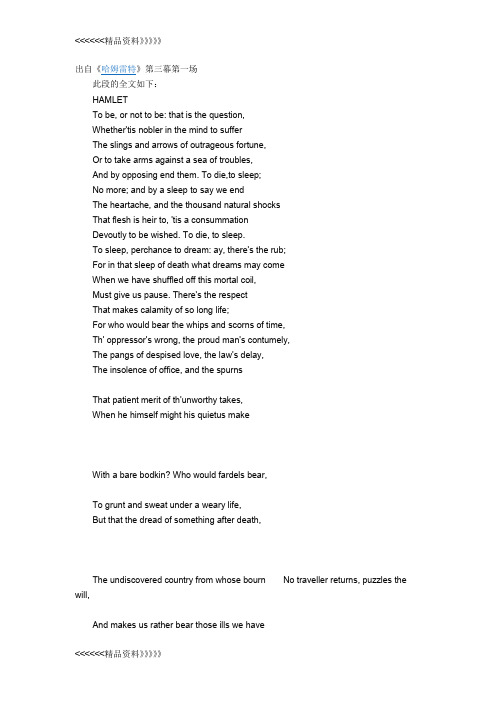
出自《哈姆雷特》第三幕第一场此段的全文如下:HAMLETTo be, or not to be: that is the question,Whether'tis nobler in the mind to sufferThe slings and arrows of outrageous fortune,Or to take arms against a sea of troubles,And by opposing end them. To die,to sleep;No more; and by a sleep to say we endThe heartache, and the thousand natural shocksThat flesh is heir to, 'tis a consummationDevoutly to be wished. To die, to sleep.To sleep, perchance to dream: ay, there's the rub;For in that sleep of death what dreams may comeWhen we have shuffled off this mortal coil,Must give us pause. There's the respectThat makes calamity of so long life;For who would bear the whips and scorns of time,Th' oppressor's wrong, the proud man's contumely,The pangs of despised love, the law's delay,The insolence of office, and the spurnsThat patient merit of th'unworthy takes,When he himself might his quietus makeWith a bare bodkin? Who would fardels bear,To grunt and sweat under a weary life,But that the dread of something after death,The undiscovered country from whose bourn No traveller returns, puzzles the will,And makes us rather bear those ills we haveThan fly to others that we know not of?Thus conscience does make cowards of us all,And thus the native hue of resolutionIs sicklied o'er with the pale cast of thought,And enterprises of great pitch and momentWith this regard their currents turn awryAnd lose the name of action.编辑本段译文生存还是毁灭, 这是个值得考虑的问题: 默然忍受命运暴虐的毒箭, 或是挺身反抗人世无涯的苦难, 通过斗争把他们扫清,这两种行为,哪一种更高贵? 死了,睡着了,什么都完了。
to be or not to be赏析
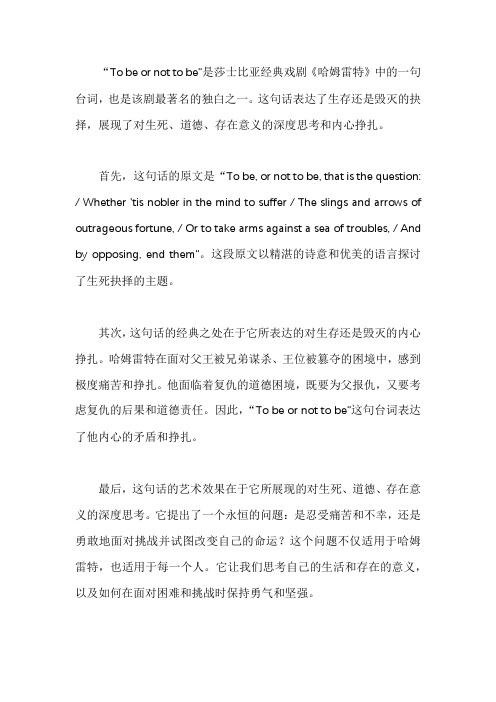
“To be or not to be”是莎士比亚经典戏剧《哈姆雷特》中的一句台词,也是该剧最著名的独白之一。
这句话表达了生存还是毁灭的抉择,展现了对生死、道德、存在意义的深度思考和内心挣扎。
首先,这句话的原文是“To be, or not to be, that is the question: / Whether 'tis nobler in the mind to suffer / The slings and arrows of outrageous fortune, / Or to take arms against a sea of troubles, / And by opposing, end them”。
这段原文以精湛的诗意和优美的语言探讨了生死抉择的主题。
其次,这句话的经典之处在于它所表达的对生存还是毁灭的内心挣扎。
哈姆雷特在面对父王被兄弟谋杀、王位被篡夺的困境中,感到极度痛苦和挣扎。
他面临着复仇的道德困境,既要为父报仇,又要考虑复仇的后果和道德责任。
因此,“To be or not to be”这句台词表达了他内心的矛盾和挣扎。
最后,这句话的艺术效果在于它所展现的对生死、道德、存在意义的深度思考。
它提出了一个永恒的问题:是忍受痛苦和不幸,还是勇敢地面对挑战并试图改变自己的命运?这个问题不仅适用于哈姆雷特,也适用于每一个人。
它让我们思考自己的生活和存在的意义,以及如何在面对困难和挑战时保持勇气和坚强。
总之,“To be or not to be”是一句极具思想深度和人生哲理的经典台词,它让我们对生死、道德、存在意义有了更深刻的认识和理解。
哈姆雷特经典原文翻译

出自《哈姆雷特》第三幕第一场此段的全文如下:HAMLETTo be, or not to be: that is the question,Whether'tis nobler in the mind to sufferThe slings and arrows of outrageous fortune,Or to take arms against a sea of troubles,And by opposing end them. To die,to sleep;No more; and by a sleep to say we endThe heartache, and the thousand natural shocksThat flesh is heir to, 'tis a consummationDevoutly to be wished. To die, to sleep.To sleep, perchance to dream: ay, there's the rub;For in that sleep of death what dreams may comeWhen we have shuffled off this mortal coil,Must give us pause. There's the respectThat makes calamity of so long life;For who would bear the whips and scorns of time,Th' oppressor's wrong, the proud man's contumely, The pangs of despised love, the law's delay,The insolence of office, and the spurnsThat patient merit of th'unworthy takes,When he himself might his quietus makeWith a bare bodkin? Who would fardels bear,To grunt and sweat under a weary life,But that the dread of something after death,The undiscovered country from whose bournNo traveller returns, puzzles the will,And makes us rather bear those ills we haveThan fly to others that we know not of?Thus conscience does make cowards of us all,And thus the native hue of resolutionIs sicklied o'er with the pale cast of thought,And enterprises of great pitch and momentWith this regard their currents turn awryAnd lose the name of action.编辑本段译文生存还是毁灭, 这是个值得考虑的问题: 默然忍受命运暴虐的毒箭, 或是挺身反抗人世无涯的苦难, 通过斗争把他们扫清,这两种行为,哪一种更高贵? 死了,睡着了,什么都完了。
《哈姆雷特》独白To be ,or not to be译文对比分析
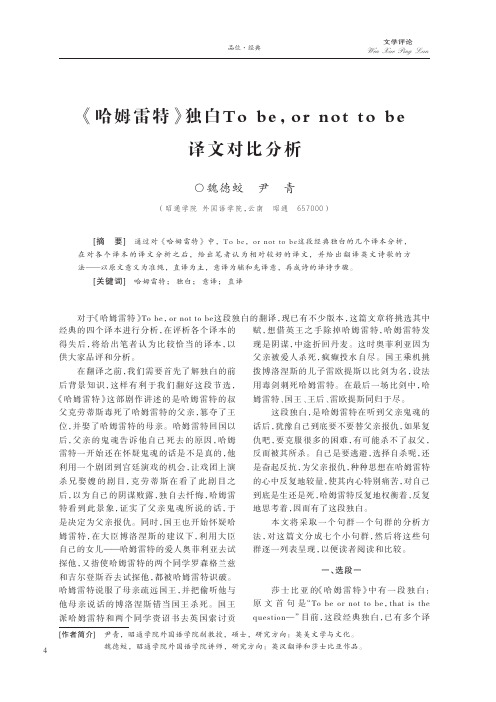
品位·经典4文学评论Wen Xue Ping Lun[作者简介] 尹青,昭通学院外国语学院副教授,硕士,研究方向:英美文学与文化。
魏德蛟,昭通学院外国语学院讲师,研究方向:英汉翻译和莎士比亚作品。
《哈姆雷特》独白To be,or not to be译文对比分析○魏徳蛟 尹 青(昭通学院 外国语学院,云南 昭通 657000)[摘 要] 通过对《哈姆雷特》中,To…be,or…not…to…be这段经典独白的几个译本分析,在对各个译本的译文分析之后,给出笔者认为相对较好的译文,并给出翻译英文诗歌的方法——以原文意义为准绳,直译为主,意译为辅和先译意,再成诗的译诗步骤。
[关键词] 哈姆雷特;……独白;……意译;……直译对于《哈姆雷特》To be,or not to be这段独白的翻译,现已有不少版本,这篇文章将挑选其中经典的四个译本进行分析,在评析各个译本的得失后,将给出笔者认为比较恰当的译本,以供大家品评和分析。
在翻译之前,我们需要首先了解独白的前后背景知识,这样有利于我们翻好这段节选,《哈姆雷特》这部剧作讲述的是哈姆雷特的叔父克劳蒂斯毒死了哈姆雷特的父亲,篡夺了王位,并娶了哈姆雷特的母亲。
哈姆雷特回国以后,父亲的鬼魂告诉他自己死去的原因,哈姆雷特一开始还在怀疑鬼魂的话是不是真的,他利用一个剧团到宫廷演戏的机会,让戏团上演杀兄娶嫂的剧目,克劳蒂斯在看了此剧目之后,以为自己的阴谋败露,独自去忏悔,哈姆雷特看到此景象,证实了父亲鬼魂所说的话,于是决定为父亲报仇。
同时,国王也开始怀疑哈姆雷特,在大臣博洛涅斯的建议下,利用大臣自己的女儿——哈姆雷特的爱人奥菲利亚去试探他,又指使哈姆雷特的两个同学罗森格兰兹和吉尔登斯吞去试探他,都被哈姆雷特识破。
哈姆雷特说服了母亲疏远国王,并把偷听他与他母亲说话的博洛涅斯错当国王杀死。
国王派哈姆雷特和两个同学赍诏书去英国索讨贡赋,想借英王之手除掉哈姆雷特,哈姆雷特发现是阴谋,中途折回丹麦。
'生存还是死亡,这是一个问题。'出自什么地方?
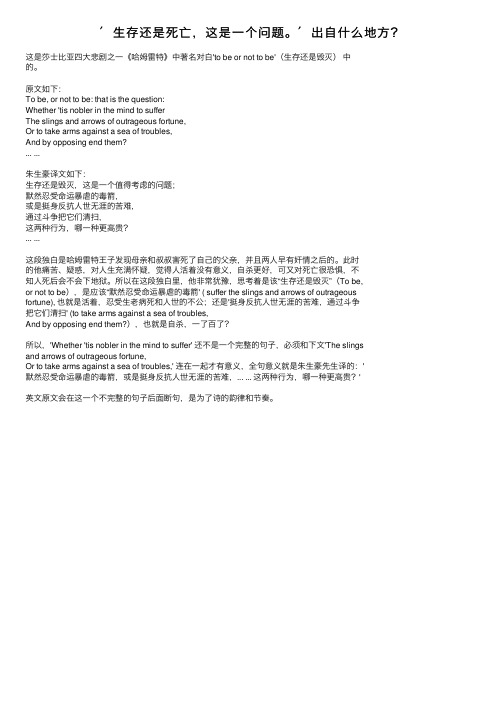
'⽣存还是死亡,这是⼀个问题。
'出⾃什么地⽅?这是莎⼠⽐亚四⼤悲剧之⼀《哈姆雷特》中著名对⽩'to be or not to be'(⽣存还是毁灭)中的。
原⽂如下:To be, or not to be: that is the question:Whether 'tis nobler in the mind to sufferThe slings and arrows of outrageous fortune,Or to take arms against a sea of troubles,And by opposing end them?... ...朱⽣豪译⽂如下:⽣存还是毁灭,这是⼀个值得考虑的问题;默然忍受命运暴虐的毒箭,或是挺⾝反抗⼈世⽆涯的苦难,通过⽃争把它们清扫,这两种⾏为,哪⼀种更⾼贵?... ...这段独⽩是哈姆雷特王⼦发现母亲和叔叔害死了⾃⼰的⽗亲,并且两⼈早有奸情之后的。
此时的他痛苦、疑惑,对⼈⽣充满怀疑,觉得⼈活着没有意义,⾃杀更好,可⼜对死亡很恐惧,不知⼈死后会不会下地狱。
所以在这段独⽩⾥,他⾮常犹豫,思考着是该“⽣存还是毁灭”(To be,or not to be),是应该“默然忍受命运暴虐的毒箭' ( suffer the slings and arrows of outrageous fortune), 也就是活着,忍受⽣⽼病死和⼈世的不公;还是'挺⾝反抗⼈世⽆涯的苦难,通过⽃争把它们清扫' (to take arms against a sea of troubles,And by opposing end them?),也就是⾃杀,⼀了百了?所以,'Whether 'tis nobler in the mind to suffer' 还不是⼀个完整的句⼦,必须和下⽂'The slingsand arrows of outrageous fortune,Or to take arms against a sea of troubles,' 连在⼀起才有意义,全句意义就是朱⽣豪先⽣译的:'默然忍受命运暴虐的毒箭,或是挺⾝反抗⼈世⽆涯的苦难,... ... 这两种⾏为,哪⼀种更⾼贵?'英⽂原⽂会在这⼀个不完整的句⼦后⾯断句,是为了诗的韵律和节奏。
哈姆雷特独白中英对照
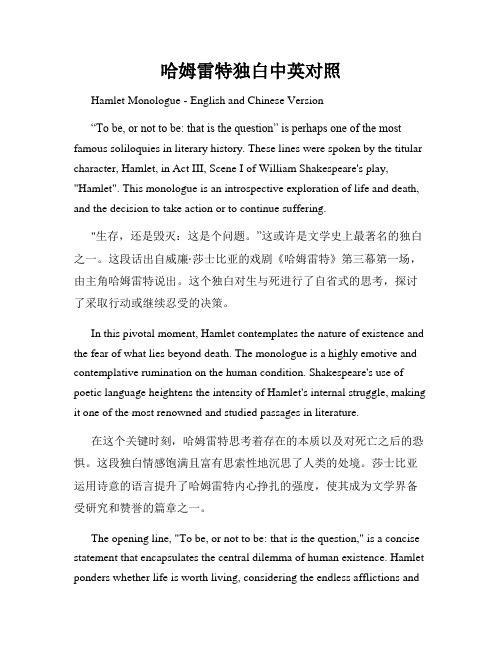
哈姆雷特独白中英对照Hamlet Monologue - English and Chinese Version“To be, or not to be: that is the question” is perhaps one of the most famous soliloquies in literary history. These lines were spoken by the titular character, Hamlet, in Act III, Scene I of William Shakespeare's play, "Hamlet". This monologue is an introspective exploration of life and death, and the decision to take action or to continue suffering."生存,还是毁灭:这是个问题。
”这或许是文学史上最著名的独白之一。
这段话出自威廉·莎士比亚的戏剧《哈姆雷特》第三幕第一场,由主角哈姆雷特说出。
这个独白对生与死进行了自省式的思考,探讨了采取行动或继续忍受的决策。
In this pivotal moment, Hamlet contemplates the nature of existence and the fear of what lies beyond death. The monologue is a highly emotive and contemplative rumination on the human condition. Shakespeare's use of poetic language heightens the intensity of Hamlet's internal struggle, making it one of the most renowned and studied passages in literature.在这个关键时刻,哈姆雷特思考着存在的本质以及对死亡之后的恐惧。
Hamlet经典独白to-be--or-not-to-be英汉对照及解析
This is an internal philosophical debate on the advantages andHamlet(Act 3, Scene 1, lines 55-86)To be, or not to be: that is the question,Whether'tis nobler in the mind to sufferThe slings and arrows of outrageous fortune,Or to take arms against a sea of troubles,And by opposing end them. To die, to sleep;No more; and by a sleep to say we endThe heartache, and the thousand natural shocksThat flesh is heir to, 'tis a consummationDevoutly to be wished. To die, to sleep.To sleep, perchance to dream: ay, there's the rub;For in that sleep of death what dreams may comeWhen we have shuffled off this mortal coil,Must give us pause. There's the respectThat makes calamity of so long life;For who would bear the whips and scorns of time,Th' oppressor's wrong, the proud man's contumely,The pangs of despised love, the law's delay,The insolence of office, and the spurnsThat patient merit of th'unworthy takes,When he himself might his quietus makeWith a bare bodkin Who would fardels bear,To grunt and sweat under a weary life,But that the dread of something after death,The undiscovered country from whose bournNo traveller returns, puzzles the will,And makes us rather bear those ills we haveThan fly to others that we know not ofThus conscience does make cowards of us all,And thus the native hue of resolutionIs sicklied o'er with the pale cast of thought,And enterprises of great pith and momentWith this regard their currents turn awryAnd lose the name of action.生存还是毁灭,这是一个值得考虑的问题;默然忍受命运暴虐的毒箭,或是挺身反抗人世无涯的苦难,这两种行为,哪一种更加高尚死了;睡着了;什么都完了;要是在这一种睡眠之中,我们心头的创痛,以及其他无数血肉之躯所不能避免的打击,都可以从此消失,那正是我们求之不得的结局。
HAMLET(to-be-or-not-to-be片段-中英对照)
The undiscover'd country, from whose bourn
No traveller return, spuzzles the will,
And makes us rather bear those ills we have
For in that sleep of death what dreams may come,
When we have shuffled(摆脱)off this mortal coil,
Must give us pause:there's the respect
That makes calamity of so long life;
官吏的横暴
和费尽辛勤所换来的小人的鄙视,
要是他只要用一柄小小的刀子,就可以清算他自己的一生?谁愿意负着这样的重担,
在烦劳的生命的压迫下呻吟流汗,,
倘不是因为惧怕不可知的死后,惧怕那
从来不曾有一个旅人回来过的
神秘之国,是它迷惑了我们的意志
使我们宁愿忍受目前的磨折,
不敢向我们所不知道的痛苦飞去?
这样,重重的顾虑使我们全变成了懦夫,
那正是我们求之不得的结局。死了;睡着了;
睡着了也许还会做皮囊以后,
在那死的睡眠里,究竟将要做些什么梦,
那不能不使我们踌躇顾虑。
人们甘心久困于患难之中,也就是为了这个缘故;
谁愿意忍受人世的鞭挞和讥嘲、
压迫者的凌辱、傲慢者的冷眼、
被轻蔑的爱情的惨痛、法律的迁延、
And enterprises of great pith and moment
读书心得——《哈姆雷特》独白To be,or not to be译文对比分析
读书心得——《哈姆雷特》独白To be,or not to be译文对比分析对于《哈姆雷特》To be,or not to be这段独白的翻译,现已有不少版本,这篇文章将挑选其中经典的四个译本进行分析,在评析各个译本的得失后,将给出笔者认为比较恰当的译本,以供大家品评和分析。
在翻译之前,我们需要首先了解独白的前后背景知识,这样有利于我们翻好这段节选,《哈姆雷特》这部剧作讲述的是哈姆雷特的叔父克劳蒂斯毒死了哈姆雷特的父亲,篡夺了王位,并娶了哈姆雷特的母亲。
哈姆雷特回国以后,父亲的鬼魂告诉他自己死去的原因,哈姆雷特一开始还在怀疑鬼魂的话是不是真的,他利用一个剧团到宫廷演戏的机会,让戏团上演杀兄娶嫂的剧目,克劳蒂斯在看了此剧目之后,以为自己的阴谋败露,独自去忏悔,哈姆雷特看到此景象,证实了父亲鬼魂所说的话,于是决定为父亲报仇。
同时,国王也开始怀疑哈姆雷特,在大臣博洛涅斯的建议下,利用大臣自己的女儿——哈姆雷特的爱人奥菲利亚去试探他,又指使哈姆雷特的两个同学罗森格兰兹和吉尔登斯吞去试探他,都被哈姆雷特识破。
哈姆雷特说服了母亲疏远国王,并把偷听他与他母亲说话的博洛涅斯错当国王杀死。
国王派哈姆雷特和两个同学赍诏书去英国索讨贡赋,想借英王之手除掉哈姆雷特,哈姆雷特发现是阴谋,中途折回丹麦。
这时奥菲利亚因为父亲被爱人杀死,疯癫投水自尽。
国王乘机挑拨博洛涅斯的儿子雷欧提斯以比剑为名,设法用毒剑刺死哈姆雷特。
在最后一场比剑中,哈姆雷特、国王、王后、雷欧提斯同归于尽。
这段独白,是哈姆雷特在听到父亲鬼魂的话后,犹豫自己到底要不要替父亲报仇,如果复仇吧,要克服很多的困难,有可能杀不了叔父,反而被其所杀。
自己是要逃避,选择自杀呢,还是奋起反抗,为父亲报仇,种种思想在哈姆雷特的心中反复地较量,使其内心特别痛苦,对自己到底是生还是死,哈姆雷特反复地权衡着,反复地思考着,因而有了这段独白。
本文将采取一个句群一个句群的分析方法,对这篇文分成七个小句群,然后将这些句群逐一列表呈现,以便读者阅读和比较。
“To be,or not to be,that is the question:”的翻译-8页word资
“Tobe,ornottobe,thatisthequestion:”的翻译1 引言提及莎士比亚,人们总会想到他的著名悲剧《哈姆莱特》(Hamlet)。
说到哈姆莱特,无人不晓他那段著名独白的第一行: “To be, or not to be, that is the question:”几百年来世界范围内的莎学研究,成果可谓汗牛充栋。
有关《哈姆莱特》的著述和论文,更是不计其数。
而在有关《哈姆莱特》的研究中,对这句脍炙人口、精妙绝伦的独白的理解分歧最大,发表的论述也最多,真可谓见仁见智,各领风骚,争论长达数百年之久,至今仍在继续,尚无定论。
Jenkins Harold 曾指出,在莎士比亚的剧作中,这段独白“被人讨论得最多,误解也最甚”[1]。
在我国,《哈姆莱特》也受到特别的青睐。
自从1921年田汉先生首次译出以来,迄今已有10个以上的汉译本。
我国的莎剧翻译家对这段著名独白的理解和翻译也颇为不一,可谓仁者见仁,智者见智,群起争鸣,发人深思。
2 名家名译比较分析及译法探索以朱生豪、梁实秋为代表的莎剧专家和学者,依据自身的学识修养和理解,从不尽相同的角度对该句独白作出了各具特色的诠释和经典翻译,可谓是世界莎剧翻译的一朵奇葩,为世界莎学研究做出了不可磨灭的伟大贡献。
但文学翻译毕竟是一种有缺憾的艺术,世间不存在绝对完美、无可挑剔的译作,正所谓“译无定本”。
这就是说,他们的理解和翻译还不尽完美,还存在着这样那样的缺点和不足,有待于后来者站在这些巨人的肩上继续努力和探索,找出更佳的翻译方法,以期更加接近莎翁本意,还莎剧本来面貌。
下面就从这些名家名译出发,通过对它们的比较分析,来进一步探讨该句独白更为理想的翻译。
2.1 名家名译笔者目前所收集到的名家名译如下:朱生豪:生存还是毁灭,这是一个值得考虑的问题;梁实秋:死后还是存在,还是不存在,――这是问题;曹未风:生存还是不生存:就是这个问题:孙大雨:是生存还是消亡,问题的所在;林同济:存在,还是毁灭,就这问题了。
- 1、下载文档前请自行甄别文档内容的完整性,平台不提供额外的编辑、内容补充、找答案等附加服务。
- 2、"仅部分预览"的文档,不可在线预览部分如存在完整性等问题,可反馈申请退款(可完整预览的文档不适用该条件!)。
- 3、如文档侵犯您的权益,请联系客服反馈,我们会尽快为您处理(人工客服工作时间:9:00-18:30)。
精品文档
精品文档 Hamlet
(Act 3, Scene 1, lines 55-86)
To be, or not to be: that is the question,
Whether'tis nobler in the mind to suffer
The slings and arrows of outrageous fortune,
Or to take arms against a sea of troubles,
And by opposing end them. To die, to sleep;
No more; and by a sleep to say we end
The heartache, and the thousand natural shocks
That flesh is heir to, 'tis a consummation
Devoutly to be wished. To die, to sleep.
To sleep, perchance to dream: ay, there's the rub;
For in that sleep of death what dreams may come
When we have shuffled off this mortal coil,
Must give us pause. There's the respect
That makes calamity of so long life;
For who would bear the whips and scorns of time,
Th' oppressor's wrong, the proud man's contumely,
The pangs of despised love, the law's delay,
The insolence of office, and the spurns
That patient merit of th'unworthy takes,
When he himself might his quietus make
With a bare bodkin? Who would fardels bear,
To grunt and sweat under a weary life,
But that the dread of something after death,
The undiscovered country from whose bourn
No traveller returns, puzzles the will,
And makes us rather bear those ills we have
Than fly to others that we know not of?
Thus conscience does make cowards of us all,
And thus the native hue of resolution
Is sicklied o'er with the pale cast of thought,
And enterprises of great pith and moment
With this regard their currents turn awry
And lose the name of action.
生存还是毁灭,这是一个值得考虑的问题;默然忍受命运暴虐的毒箭,或是挺身反抗人世无涯的苦难,这两种行为,哪一种更加高尚?死了;睡着了;什么都完了;要是在这一种睡眠之中,我们心头的创痛,以及其他无数血肉之躯所不能避免的打击,都可以从此消失,那正是我们求之不得的结局。
死了;睡着了;睡着了也许还会做梦;嗯,阻碍就在这儿:因为当我们摆脱了这一具朽腐的皮囊以后,在那死的睡眠里,究竟将要做些什么梦,那不能不使我们踌躇顾虑。
人们甘心久困于患难之中,也就是为了这个缘故;谁愿意忍受人世的鞭挞和讥嘲、压迫者的凌辱、傲慢者的冷眼、被轻蔑的爱情的惨痛、法律的迁延、官吏的横暴和费尽辛勤所换来的小人的鄙视,要是他只要用一柄小小的刀子,就可以清算他自己的一生?谁愿意负着这样的重担,在烦劳的生命的压迫下呻吟流汗,倘不是因为惧怕不可知的死后,惧怕那从来不曾有一个旅人回来过的神秘之国,是它迷惑了我们的意志,使我们宁愿忍受目前的磨折,不敢向我们所不知道的痛 苦飞去?这样,重重的顾虑使我们全变成了懦夫,决心的赤热的光彩,被审慎的思维盖上了一层灰色,伟大的事业在这一种考虑之下,也会逆流而退,失去了行动的意义。
——《哈姆雷特》(英·William Shakespeare )中的经典独白soliloquy [s ə'l ɪl əkw ɪ] This is an internal philosophical debate on the advantages and disadvantages of existence, and whether it is one ’s right to end his/her own life.。
